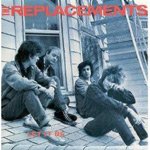[Note: This review is intended as a friendly rebuttal to [David Brusie’s exaltation of Tim->http://tinymixtapes.com/The-Replacements].]
When discussing The Replacements, I am fond of quoting Robert Christgau, the Dean of American Rock Critics, who, in his original A+ review of Let It Be, wrote: “Bands like this don’t have roots, or principles either, they just have stuff they like.” Now, throughout his long and inspiring career, Christgau has been guilty of portentous idiocy from time to time (Bossanova is the best Pixies album?), but when he’s right, he’s right, and Let It Be is the ‘Mats’ indisputable masterpiece. There are those, however, who call it “scattershot” and dismiss Paul Westerberg’s jumbling of sensitive balladry and sloppy kitsch as bratty self-sabotage. These detractors tend to prefer 1985’s Tim, the band’s Sire debut, which contains 11 competently-played, easily-digestible pop songs that all sound as though they actually belong on the same record. But it was precisely this earlier mess that defined The Replacements; they were just kids in a garage, pinching Ted Nugent riffs and singing about drugs and dicks, occasionally tossing off something beautiful and pretending not to realize it. Their jokes had just as much soul as their art --- when Westerberg sang “Gary’s got a boner/ Gary’s got a soft-on,” he meant it.
Three records in, it took guts for these guys -- who had started off in Minneapolis circa 1979 as slightly-tuneful hardcore punkers -- to betray any hint of sincerity, maturity, or ambition, lest the devoted fan lose his bearings. Of course, they had never let that sort of thing bother them; The Replacements were legendary for antagonizing their audiences with almost Kaufman-esque cruelty. At a gig in, say, Nashville, the band was likely to play fast and loud until only punks remained, at which point they would dust off the country moves. Ho ho. Slashed amps and tipped vans were not uncommon.
It was a given that Let It Be was going to cost The Replacements a fair slice of their original fanbase. If the songs hadn’t been worth a damn, that might’ve been the end right there. Still, I imagine scores of arty-farty R.E.M. disciples buying the record for Peter Buck’s solo on “I Will Dare,” straining to stick it out at least through Side A, then frisbeeing the thing against a wall before collapsing back into the safe, reliable arms of jangle-pop.
Describing this album as scattershot hardly does it justice. Not once does it settle into a certain groove, musically or otherwise, for two songs in a row. The folky shuffle of “I Will Dare” gives way to the sweetly punkish “Favorite Thing,” before “We’re Coming Out” completely eclipses the band’s first four years of hardcore. Only The Replacements would have sandwiched the bleary-eyed jazz-pop of “Androgynous” between “Tommy Gets His Tonsils Out” and a shambolic (and underrated) cover of KISS’s “Black Diamond.” George Martin has been quoted as saying he always wanted to trim The White Album down to one LP. Just think, if The Beatles had taken his advice and had been four boozy Midwesterners born from 1959-66 who shared a penchant for The New York Dolls and The Stones, The White Album would have sounded something like Let It Be. (That made no sense, I know, but it was fun to write.)
As for the copping of the Fab Four’s title, it was the ‘Mats’ canny way of making a brazen grab at classic-rock status and simultaneously admitting they’d never make it. But, true to form, they weren’t giving themselves enough credit. And I think they knew it, even then.
